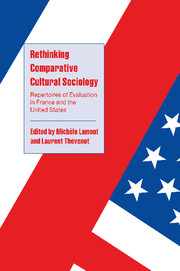Book contents
- Frontmatter
- Contents
- Notes on contributors
- Acknowledgements
- 1 Introduction: toward a renewed comparative cultural sociology
- Part I Race, gender, and multiculturalism
- Part II The cultural sphere: publishing, journalism, and the arts
- Part III Political cultures and practices
- Conclusion: Exploring the French and the American polity
- References
- Index
Conclusion: Exploring the French and the American polity
Published online by Cambridge University Press: 26 March 2010
- Frontmatter
- Contents
- Notes on contributors
- Acknowledgements
- 1 Introduction: toward a renewed comparative cultural sociology
- Part I Race, gender, and multiculturalism
- Part II The cultural sphere: publishing, journalism, and the arts
- Part III Political cultures and practices
- Conclusion: Exploring the French and the American polity
- References
- Index
Summary
This chapter offers a reflection on the implications of our findings for understanding the social bonds that link members of the French and American polity. There are a number of perspectives that we could have used to describe the thread that runs through our various case studies. In the introduction, we identified some major trends in the relative salience of boundaries across national contexts. The centrality of market arguments in the United States, and of solidarity (civic) arguments in France are cases in point. In our conclusion, we could focus on the conditions that support the frequent use of such criteria across national settings. We could also trace their impact on French and American collective identities as they are formulated, for instance, around issues of sexual harassment. Instead, we have chosen to speculatively explore how our various criteria of evaluation are typically combined and sometimes conflict, and how they are used to define the polity and maintain a political community in the two national settings. In the process, we bring together various themes that emerge from our specific case studies, elaborate on them, and suggest directions for further explorations.
In the first section, we address the drawing of boundaries and the closure of the communities of reference they suppose – in particular, the weight given to race as a mechanism of closure within humanity. This is an important dimension of the definition of “common-ness” (or sociality) and as such, is essential for understanding evaluation and how people are construed as belonging together (Jenkins 1996).
- Type
- Chapter
- Information
- Rethinking Comparative Cultural SociologyRepertoires of Evaluation in France and the United States, pp. 307 - 327Publisher: Cambridge University PressPrint publication year: 2000
- 14
- Cited by



